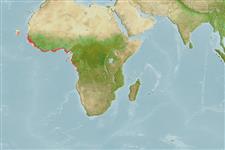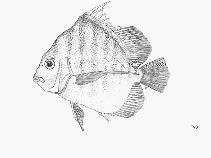Waarneming toevoegen in Fish Watcher
| Native range | All suitable habitat | Point map | Year 2050 |

|
| This map was computer-generated and has not yet been reviewed. |
| Drepane africana AquaMaps Data sources: GBIF OBIS |
Uploaden van uw Foto's en video's
Pictures | Stamps, coins, misc. | Google afbeeldingDrepane africana
Picture by FAO
Pictures | Stamps, coins, misc. | Google afbeeldingDrepane africana
Picture by FAO
Senegal country information
Common names:
Baa danbandingho, Engnoba, Ileeri gééj
Occurrence: native
Salinity: brackish
Abundance: | Ref:
Importance: minor commercial | Ref: FAO, 1994
Aquaculture: | Ref:
Regulations: | Ref:
Uses: live export: yes;
Comments: Occurs in the Sine-Saloum Estuary and Casamance River (Ref. 28587). Also Ref. 33587.
National Checklist:
Country Information: https://www.cia.gov/library/publications/resources/the-world-factbook/geos/sg.html
National Fisheries Authority: http://www.refer.sn/sngal_ct/eco/oeps/
Occurrences: Occurrences Point map
Main Ref: Bauchot, M.L., 2003
National Database:
Occurrence: native
Salinity: brackish
Abundance: | Ref:
Importance: minor commercial | Ref: FAO, 1994
Aquaculture: | Ref:
Regulations: | Ref:
Uses: live export: yes;
Comments: Occurs in the Sine-Saloum Estuary and Casamance River (Ref. 28587). Also Ref. 33587.
National Checklist:
Country Information: https://www.cia.gov/library/publications/resources/the-world-factbook/geos/sg.html
National Fisheries Authority: http://www.refer.sn/sngal_ct/eco/oeps/
Occurrences: Occurrences Point map
Main Ref: Bauchot, M.L., 2003
National Database:
Common names from other countries
Classificatie / Names Lokale namen | Synoniemen | Catalog of Fishes(Genus, Soort(en)) | ITIS | CoL | WoRMS | Cloffa
> Acanthuriformes (Surgeonfishes) > Drepaneidae (Sicklefishes)
Etymology: Drepane: Greek, drepane = sickle (Ref. 45335).
Etymology: Drepane: Greek, drepane = sickle (Ref. 45335).
Environment: milieu / climate zone / depth range / distribution range Ecologie
marien; brak water benthopelagisch; diepte 10 - 75 m (Ref. 27000), usually 20 - 50 m (Ref. 81287). Tropical; 30°N - 17°S, 27°W - 13°E
Verspreiding Landen | FAO regio's | Ecosystemen | Voorkomen | Point map | Introducties | Faunafri
Eastern Atlantic: West African coast, from Senegal to Angola (Ref. 7350, 81287). Also reported from the Canary Islands, Cape Verde (Ref. 7350) and Mauritania (Ref. 5377).
Grootte / Gewicht / Leeftijd
Maturity: Lm ? range ? - ? cm
Max length : 45.0 cm TL mannelijk / geslacht onbekend; (Ref. 1380); common length : 30.0 cm TL mannelijk / geslacht onbekend; (Ref. 3609); max. gepubliceerd gewicht: 750.00 g (Ref. 4883)
Max length : 45.0 cm TL mannelijk / geslacht onbekend; (Ref. 1380); common length : 30.0 cm TL mannelijk / geslacht onbekend; (Ref. 3609); max. gepubliceerd gewicht: 750.00 g (Ref. 4883)
Korte beschrijving Determinatiesleutels | Morfologie | Morfometrie
Dorsale stekels (totaal) : 8 - 9; Dorsale zachte stralen (totaal) : 17 - 18; Anale stekels: 3; Anale zachte stralen: 20 - 21. Diagnosis: body deep and strongly compressed, its anterior profile very steep up to dorsal-fin origin, and strongly compressed; head small; snout short; mouth small, terminal, strongly protrusible, with fleshy lips; teeth slender and pointed, set in bands in upper jaw; roof of mouth toothless; dorsal fin deeply notched; 1st dorsal fin spine small, forward-pointing and visible only in young individuals; pectorals falcate, very long, their tips almost reaching to caudal-fin base; hind margin of caudal fin slightly rounded; pelvic fins thoracic; scales finely ctenoid, covering body, bases of dorsal and anal fins and head, except snout and preopercle; preopercular margin denticulate; lateral line strongly arched (Ref. 81287).
Coloration: silvery grey, darker on back, almost white on belly; sides with a series of 8 brown, more or less faded vertical bars, always more distinct in young individuals (Ref. 81287).
Neritic species (Ref. 7350). Essentially marine, often living in groups (Ref. 81287) over sandy and muddy bottoms (Ref. 2683), between 20 and 50 m depth, and entering coastal lagoons where sexual maturation begins (Ref. 81287). Feeds of fish eggs, benthic invertebrates and detritus (Ref. 28587).
Levenscyclus en paargedrag Maturiteit | Voortplanting | Paaien | Eieren | Fecunditeit | Larven
Hoofdreferentie
Upload your references | Referenties | Coördinator | Medewerkers
Desoutter, M., 1990. Ephippidae. p. 834-836. In J.C. Quero, J.C. Hureau, C. Karrer, A. Post and L. Saldanha (eds.) Check-list of the fishes of the eastern tropical Atlantic (CLOFETA). JNICT, Lisbon; SEI, Paris; and UNESCO, Paris. Vol. 2. (Ref. 7350)
Status op de Rode Lijst van het IUCN (Ref. 130435: Version 2024-1)
Niet bedreigd (LC) ; Date assessed: 23 May 2012
Gevaar voor de mens
Harmless
Gebruik door de mens
Visserij: van minder commercieel belang
FAO(visserij: productie; publication : search) | FishSource |
Meer informatie
Population dynamics
Groeiparameters
Max. ages / sizes
Length-weight rel.
Length-length rel.
Lengtefrequenties
Massaconversie
Rekrutering
Abundantie
Groeiparameters
Max. ages / sizes
Length-weight rel.
Length-length rel.
Lengtefrequenties
Massaconversie
Rekrutering
Abundantie
Life cycle
Voortplanting
Maturiteit
Fecunditeit
Paaien
Spawning aggregations
Eieren
Ontwikkeling van de eieren
Larven
Larvale populatiedynamiek
Voortplanting
Maturiteit
Fecunditeit
Paaien
Spawning aggregations
Eieren
Ontwikkeling van de eieren
Larven
Larvale populatiedynamiek
Anatomy
Kieuwoppervlak
Brain
Otolith
Kieuwoppervlak
Brain
Otolith
Physiology
Body composition
Nutrients
Zuurstofverbruik
Zwemtype
Zwemsnelheid
Visual pigments
Fish sound
Diseases & Parasites
Toxicity (LC50s)
Body composition
Nutrients
Zuurstofverbruik
Zwemtype
Zwemsnelheid
Visual pigments
Fish sound
Diseases & Parasites
Toxicity (LC50s)
Genetics
Genetica
Heterozygosity
Erfelijkheid
Genetica
Heterozygosity
Erfelijkheid
Human related
Aquaculture systems
Aquacultuurprofielen
Kweeklijnen
Ciguatera cases
Stamps, coins, misc.
Aquaculture systems
Aquacultuurprofielen
Kweeklijnen
Ciguatera cases
Stamps, coins, misc.
Tools
E-boek | Veldgids | Lengtefrequentie Tool | Levenscyclus tool | Verspreidingskaart | Classification Tree
| Catch-MSY |
Speciale rapporten
Bekijk gegevens voor het houden in een aquarium | Bekijk Fact Sheets voor de soort | Bekijk Aquacultuur Fact Sheets
Download XML
Internetbronnen
Aquatic Commons | BHL | Cloffa | Websites from users | Bekijk FishWatcher | CISTI | Catalog of Fishes(Genus, Soort(en)) | DiscoverLife | ECOTOX | Faunafri | Fishtrace | GenBank(genoom, nucleotide) | GloBI | GOBASE | | Google Books | Google Scholar | Google | IGFA World Record | MitoFish | Otolith Atlas of Taiwan Fishes | PubMed | Reef Life Survey | Scirus | SeaLifeBase | Tree of Life | Wikipedia(ga naar, zoek) | World Records Freshwater Fishing | Zoological Record
Estimates based on models
Preferred temperature (Ref. 115969): 19.2 - 28, mean 26.1 (based on 132 cells).
Fylogenetische diversiteitsindex (Ref. 82804): PD50 = 0.7500 [Uniqueness, from 0.5 = low to 2.0 = high].
Bayesian length-weight: a=0.01380 (0.00724 - 0.02632), b=2.98 (2.81 - 3.15), in cm Total Length, based on LWR estimates for this species & (Sub)family-body (Ref. 93245).
Trofisch niveau (Ref. 69278): 3.1 ±0.41 se; based on food items.
Weerstandsvermogen (Ref. 120179): Gemiddeld, minimale populatieverdubbelingstijd 1,4-4,4 jaar (K=0.13-0.25).
Fishing Vulnerability (Ref. 59153): High vulnerability (56 of 100).




